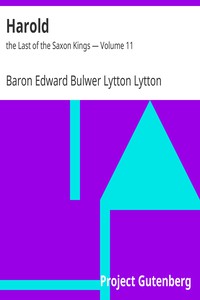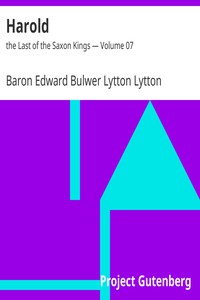Harold : the Last of the Saxon Kings — Complete by Lytton (good books for 8th graders .TXT) 📗

- Author: Lytton
Book online «Harold : the Last of the Saxon Kings — Complete by Lytton (good books for 8th graders .TXT) 📗». Author Lytton
“They are: and my lord the King’s chosen council.”
“Admit them: pardon, Aldyth; affairs fit only for men claim me now.”
The Lady of England took the hint, and rose.
“But the even-mete will summon thee soon,” said she. Harold, who had already descended from his chair of state, and was bending over a casket of papers on the table, replied:
“There is food here till the morrow; wait me not.” Aldyth sighed, and withdrew at the one door, while the thegns most in Harold’s confidence entered at the other. But, once surrounded by her maidens, Aldyth forgot all, save that she was again a queen,—forgot all, even to the earlier and less gorgeous diadem which her lord’s hand had shattered on the brows of the son of Pendragon.
Leofwine, still gay and blithe-hearted, entered first: Gurth followed, then Haco, then some half-score of the greater thegns.
They seated themselves at the table, and Gurth spoke first:
“Tostig has been with Count William.”
“I know it,” said Harold.
“It is rumoured that he has passed to our uncle Sweyn.”
“I foresaw it,” said the King.
“And that Sweyn will aid him to reconquer England for the Dane.”
“My bode reached Sweyn, with letters from Githa, before Tostig; my bode has returned this day. Sweyn has dismissed Tostig; Sweyn will send fifty ships, armed with picked men, to the aid of England.”
“Brother,” cried Leofwine, admiringly, “thou providest against danger ere we but surmise it.”
“Tostig,” continued the King, unheeding the compliment, “will be the first assailant: him we must meet. His fast friend is Malcolm of Scotland: him we must secure. Go thou, Leofwine, with these letters to Malcolm.—The next fear is from the Welch. Go thou, Edwin of Mercia, to the princes of Wales. On thy way, strengthen the forts and deepen the dykes of the marches. These tablets hold thy instructions. The Norman, as doubtless ye know, my thegns, hath sent to demand our crown, and hath announced the coming of his war. With the dawn I depart to our port at Sandwich 232, to muster our fleets. Thou with me, Gurth.”
“These preparations need much treasure,” said an old thegn, “and thou hast lessened the taxes at the hour of need.”
“Not yet is it the hour of need. When it comes, our people will the more readily meet it with their gold as with their iron. There was great wealth in the House of Godwin; that wealth mans the ships of England. What hast thou there, Haco?”
“Thy new-issued coin: it hath on its reverse the word PEACE.” 233
Who ever saw one of those coins of the Last Saxon King, the bold simple head on the one side, that single word “Peace” on the other, and did not feel awed and touched! What pathos in that word compared with the fate which it failed to propitiate!
“Peace,” said Harold: “to all that doth not render peace, slavery. Yea, may I live to leave peace to our children! Now, peace only rests on our preparation for war. You, Morcar, will return with all speed to York, and look well to the mouth of the Humber.”
Then, turning to each of the thegns successively he gave to each his post and his duty; and that done, converse grew more general. The many things needful that had been long rotting in neglect under the Monk-king, and now sprung up, craving instant reform, occupied them long and anxiously. But cheered and inspirited by the vigour and foresight of Harold, whose earlier slowness of character seemed winged by the occasion into rapid decision (as is not uncommon with the Englishman), all difficulties seemed light, and hope and courage were in every breast.
CHAPTER VIII.
Back went Hugues Maigrot, the monk, to William, and told the reply of Harold to the Duke, in the presence of Lanfranc. William himself heard it in gloomy silence, for Fitzosborne as yet had been wholly unsuccessful in stirring up the Norman barons to an expedition so hazardous, in a cause so doubtful; and though prepared for the defiance of Harold, the Duke was not prepared with the means to enforce his threats and make good his claim.
So great was his abstraction, that he suffered the Lombard to dismiss the monk without a word spoken by him; and he was first startled from his reverie by Lanfranc’s pale hand on his vast shoulder, and Lanfranc’s low voice in his dreamy ear:
“Up! Hero of Europe: for thy cause is won! Up! and write with thy bold characters, bold as if graved with the point of the sword, my credentials to Rome. Let me depart ere the sun sets: and as I go, look on the sinking orb, and behold the sun of the Saxon that sets evermore on England!”
Then briefly, that ablest statesman of the age, (and forgive him, despite our modern lights, we must; for, sincere son of the Church, he regarded the violated oath of Harold as entailing the legitimate forfeiture of his realm, and, ignorant of true political freedom, looked upon Church and Learning as the only civilisers of men,) then, briefly, Lanfranc detailed to the listening Norman the outline of the arguments by which he intended to move the Pontifical court to the Norman side; and enlarged upon the vast accession throughout all Europe which the solemn sanction of the Church would bring to his strength. William’s reawaking and ready intellect soon seized upon the importance of the object pressed upon him. He interrupted the Lombard, drew pen and parchment towards him, and wrote rapidly. Horses were harnessed, horsemen equipped in haste, and with no unfitting retinue Lanfranc departed on the mission, the most important in its consequences that ever passed from potentate to pontiff. 234 Rebraced to its purpose by Lanfranc’s cheering assurances, the resolute, indomitable soul of William now applied itself, night and day, to the difficult task of rousing his haughty vavasours. Yet weeks passed before he could even meet a select council composed of his own kinsmen and most trusted lords. These, however, privately won over, promised to serve him “with body and goods.” But one and all they told him, he must gain the consent of the whole principality in a general council. That council was convened: thither came not only lords and knights, but merchants and traders,—all the rising middle class of a thriving state.
The Duke bared his wrongs, his claims, and his schemes. The assembly would not or did not discuss the matter in his presence, they would not be awed by its influence; and William retired from the hall. Various were the opinions, stormy the debate; and so great the disorder grew, that Fitzosborne, rising in the midst, exclaimed:
“Why this dispute?—why this unduteous discord? Is not William your lord? Hath he not need of you? Fail him now—and, you know him well—by G—- he will remember it! Aid him—and you know him well—large are his rewards to service and love!”





Comments (0)